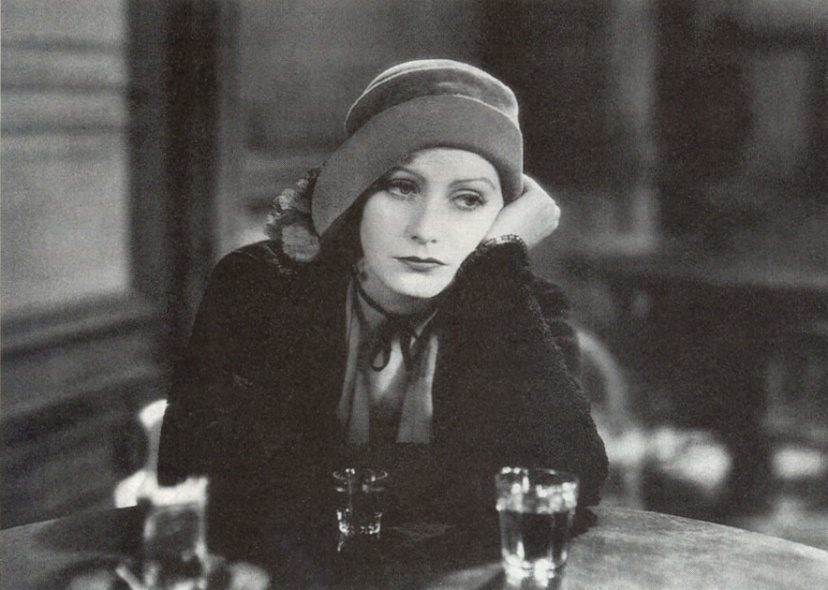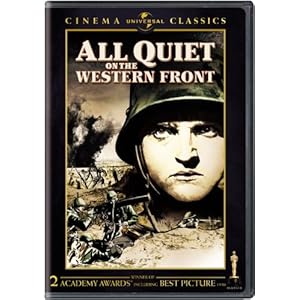 |
| George Arliss (left): Best Actor for Disraeli |
TUESDAYS WITH OSCAR: 1930
Well, the Third Academy Awards finally got it right (mostly). In its first two years, the Oscars favored the epic film (Wings) and the big box-office extravaganza with the newest technical trend (The Broadway Melody). It wouldn't be the first or last time the Academy would pick commerce over art. However, I have always argued that the Third Academy Awards was when the Oscars came of age, selecting a powerful film that is truly worthy of "Best Picture" designation. Given they were offered a choice of what would be called "Oscar-bait" in some of the films (a biopic on an 'important man', a gritty crime drama, and a musical romp), their choice was in a certain way, courageous.
Most of the kinks of transitioning from silent to sound films had been worked out (though not completely, as some of the Best Picture nominees showed). Theatricality in performances and a stiff, stagey direction was still going on, but slowly the film industry was evolving into something closer to what we think of as "Oscar" worthy. These didn't (and doesn't) usually happen, so we should appreciate when the Academy goes for art over commerce.
As always this is just for fun and should not be taken as my final decision. I should like to watch all the nominees and winners before making my final, FINAL choice. Now, on to cataloging the official winners (in bold) and my selections (in red). Also, my substitutions (in green).
THE 1930 ACADEMY AWARD WINNERS
BEST PICTURE
The Big House
Disraeli
The Divorcee
The Love Parade
We got a whole group of pretty good nominees. The lowest ranked of the nominees (The Divorcee) is at 71% on Rotten Tomatoes, and one of them (The Love Parade) has a solid 100%. It looks like this year's selection is a solid group of good films. At present I've seen only two nominees (All Quiet on the Western Front and Disraeli) and I think both are good (though one is better than the other).
We still are going from silent to sound, for some of the nominated films still would work as silent films (and with All Quiet on the Western Front, did have a silent version). We also have foreign-language versions of some of the nominated films. The Love Parade, for example, had a French-language version (Parade D'Amour) and French and German-language versions of The Big House still survive. These foreign-language versions used the same sets as the English versions, sometimes starring the same casts (like Greta Garbo or Marlene Dietrich, who spoke German, French, and English), sometimes not (like for Dracula, where the Spanish-language version shot at night after the Lugosi version ended for the day). Once dubbing was perfected, there was no need to make the same film in a different language, but it still is a shrewd way for studios to market and release their films to many markets.
As a side note, if possible one should watch the Laurel & Hardy films released en espanol. It is quite fascinating to see.
On The Divorcee, we cover adultery and divorce in an open manner, the Production Code still being a bit off. Regarding All Quiet on the Western Front, releasing an anti-war film, particularly against World War I, is quite daring considering that a.) Americans were still in the thrall of their triumph against the Kaiser, and b.) we were only thirteen years after the war, so many veterans were still around to see a negative portrayal of 'the war to end all wars'. It would be like releasing a German (not Nazi)-sympathetic Saving Private Ryan in 1958 (the year of Gigi). However, considering how isolationism was taking hold over the American public, All Quiet on the Western Front looks like it reflects a growing public mood against all war.
BEST ACTOR
George Arliss (Disraeli)
George Arliss (The Green Goddess)
Wallace Berry (The Big House)
Maurice Chevalier (The Big Pond)
Maurice Chevalier (The Love Parade)
Ronald Coleman (Bulldog Drummond)
Ronald Coleman (Condemned)
Laurence Tibbett (The Rogue Song)
Ah, the Academy is still struggling to get things right.
The shift from giving actors multiple nominations for multiple performances to acknowledging one performance in one film is slowly coming about. We have three actors being nominated for two different films, while two others received one nomination for one role. Furthermore, instead of saying, 'The Best Actor is George Arliss overall', they are singling out a specific performance.
Arliss had a leg up on the others in a certain way. He had originated the role of the British Prime Minister on stage and if memory serves correct had made a silent version of Disraeli, so he had vast experience with the part. I think this is the first time someone won an Oscar for recreating his/her stage work.
Both Coleman and Berry would go on to have long careers in the sound era, and Berry became a major star thanks to The Big House. Given he, like Marie Dressler, did not fit the traditional MGM mold of beautiful, glamorous figures, but were rather ordinary-looking, this is a remarkable feat indeed. They would also go on to win Oscars in the future.
BEST ACTRESS
Nancy Carroll (The Devil's Holiday)
Ruth Chatterton (Sarah and Son)
Greta Garbo (Anna Christie)
Greta Garbo (Romance)
Norma Shearer (The Divorcee)
Norma Shearer (Their Own Desire)
Gloria Swanson (Trespasser)
Does it matter that Norma Shearer was married to Irving Thalberg, the production head of MGM?
Out of all the nominees, Garbo was the one facing the biggest risk. Her Swedish accent would be immediately apparent, so MGM held back her sound debut for as long as possible, until finding the appropriate vehicle, Anna Christie, where it would make sense. Anna Christie was billed with the tagline, "Garbo Talks!" and talk she did, in both English and German. To the relief of MGM, Garbo proved successful, becoming one of the few stars of the silent era to continue into sound despite the language barrier.
Again, we have two nominees with two nominations, the rest with one. Out of those, I think Swanson would go on to make a return appearance at the Oscar stage, though never at the actual winner's circle.
BEST DIRECTOR
Clarence Brown (Anna Christie)
Clarence Brown (Romance)
Robert Leonard (The Divorcee)
Ernst Lubitsch (The Love Parade)
Lewis Milestone (All Quiet on the Western Front)
King Vidor (Hallelujah)
Oddly, this is the first Best Director set where things are as we know them now. Despite Brown's two nominations, the winner was for one film. We have return nominees in Milestone, Lubitsch, and Vidor, all who are considered some of the best directors of the early sound era. Even more interesting, Hallelujah is one of the first film from a major studio with an all-black cast, and one that didn't dwell in stereotypes but was remarkably respectful of the African-American experience. For it to receive such major recognition by the Academy is quite an achievement, especially considering the disgraceful bigotry of the time.
Now that we've tackled the official winners, it's time to look at my own choices, putting in my own substitutions in place of the official nominees.
BEST DIRECTOR
Ernst Lubitsch (The Love Parade)
Lewis Milestone (All Quiet on the Western Front)
King Vidor (Hallelujah)
Josef von Sternberg (The Blue Angel)
Raoul Walsh (The Big Trail)
I don't have much disagreement with the year's nominees, but I am surprised that two of the great films of that year (The Big Trail and The Blue Angel) were left out of the running. I myself have rectified that somewhat, but All Quiet on the Western Front mixes the epic horror of the battlefront with the intimacy of the men who are worn down by the brutality of it all. I confess to crying at certain parts of the film, and I have yet to find someone who hasn't seen the film and been emotionally moved by the experience.
BEST ACTRESS
Nancy Carroll (The Devil's Holiday)
Ruth Chatterton (Sarah and Son)
Marlene Dietrich (The Blue Angel)
Greta Garbo (Anna Christie)
Jean Harlow (Hell's Angels)
Norma Shearer (The Divorcee)
Gloria Swanson (The Trespasser)
Garbo Talks!
I am unsure about putting in Harlow, but in her breakthrough film she is memorable. As for Dietrich, her role as the temptress Lola-Lola is one of her signature roles. However, while I have nothing against Shearer it is Garbo's performance that is still remembered, starting from her very first line, "Gimme a whiskey, ginger ale on the side...and don't be stingy, baby."
BEST ACTOR
George Arliss (Disraeli)
Lew Ayres (All Quiet on the Western Front)
Wallace Berry (The Big House)
Maurice Chevalier (The Big Parade)
Ronald Coleman (Bulldog Drummond)
Emil Jannings (The Blue Angel)
I have nothing against Disraeli or George Arliss. One can see how well-regarded he was because he was billed as MR. George Arliss. I think well of Chevalier too. However, for me it is Ayres' performance that people will remember. The failure to nominate Ayres is a terrible, terrible oversight. When we think of the emotional range he gives, from the eager youth to the battle-hardened and cynical veteran is a brilliant performance. When he rails against his old professor for encouraging the next generation of the 'glories of war' or begging forgiveness of the man he's killed, people will always remember Lew Ayres' performance.
And now, My Choice for the Best Picture of 1930 is...
BEST PICTURE
All Quiet on the Western Front
Anna Christie
The Big Trail
The Blue Angel
The Love Parade
For the first time, the Academy and I agree. Now, I thought well of Disraeli, the only other Best Picture nominee I've seen, but after watching it I thought how good that it didn't win. I think Disraeli should be remade, because there is potential in the story and I found the script pretty witty. However, in certain ways it's still extremely stagey and over-acted, though not by Arliss himself.
I don't think many people now remember some of the other nominees like The Divorcee while others like The Blue Angel and The Big Trail (one of John Wayne's early big films) are. However, All Quiet on the Western Front is not just one of the best Best Picture winners, but one of the best films ever made.
If shown throughout the world, perhaps all wars would really stop. The cost of war is extremely high for all concerned.
For once, the Academy did pick the Best Picture. Let us celebrate one of the few times they got it right.
Next week, the 1931 Oscars.







No comments:
Post a Comment
Views are always welcome, but I would ask that no vulgarity be used. Any posts that contain foul language or are bigoted in any way will not be posted.
Thank you.